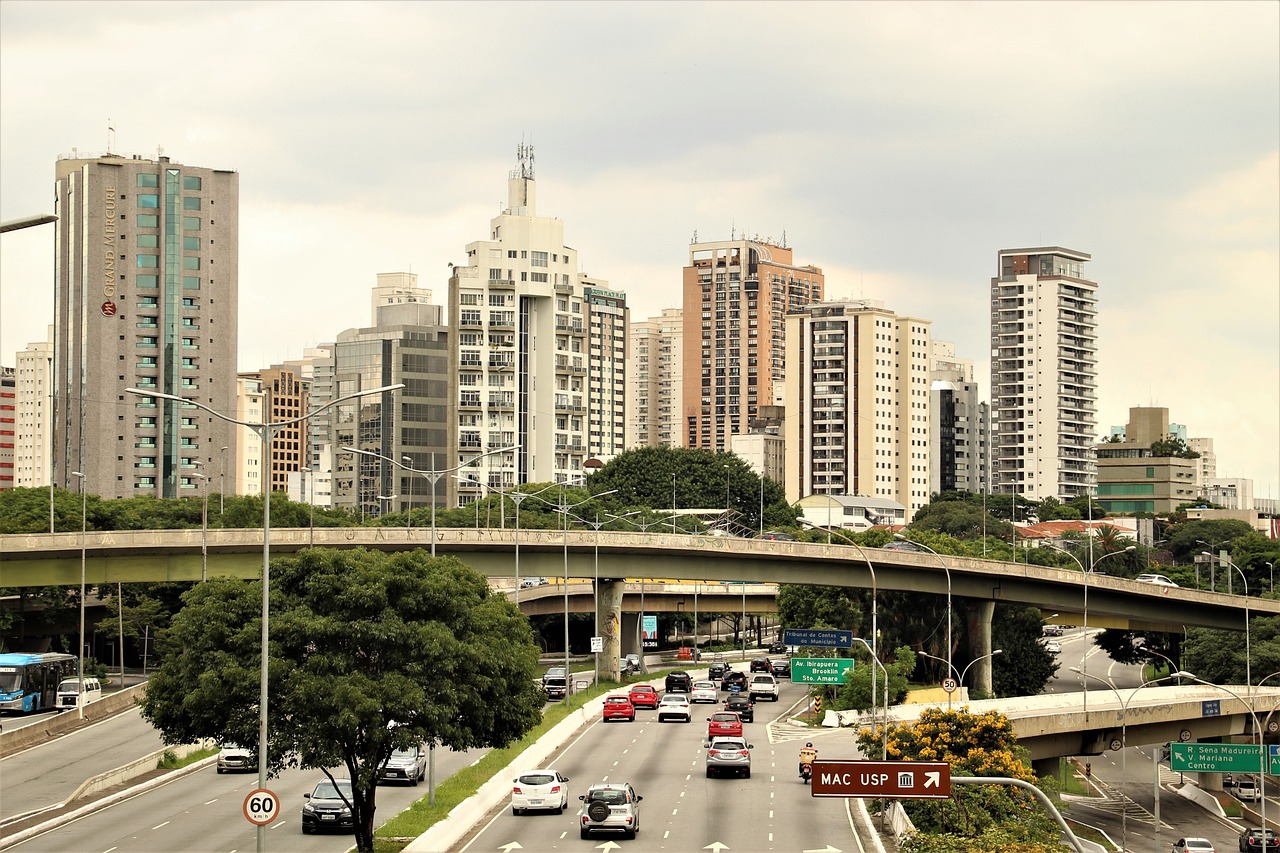Image by Ismael Braz de Oliveira Isma from Pixabay
In this post we’ll look at some Portuguese vocabulary related to cars and driving.
O meu carro: My car
Let’s start with some basic vocabulary: o carro (car), dirigir (to drive), a gasolina (gas/petrol), pôr gasolina (to get gas), encher o tanque (to fill the gas tank), o cinto de segurança (seatbelt), a garagem (garage), dar partida (no carro) (to start the car), estacionar (o carro) (to park the car), o estacionamento (parking lot), a vaga (para estacionar) (parking space), desligar o motor (to turn off the engine).
- Você tem um carro?
Do you have a car? - (Eu) comprei um carro novo/ zero.
I bought a new car. - Eu dirijo muito todas as semanas.
I drive a lot every week. - Ponha o seu cinto de segurança.
Put on your seatbelt.
- Preciso pôr gasolina.
I need to get gas. - Encha o tanque, por favor.
Fill the tank, please. - Você deixa o carro em um estacionamento ou na rua?
Do you park in a garage or on the street? - Não consigo achar uma vaga para estacionar.
I can’t find a parking space.
Destrave a porta do carro! Unlock the car door!
Now let’s look at some vocabulary for parts of a car. a porta do carro (car door), o parabrisa (windshield), os limpadores de parabrisa (windshield wipers), abrir / fechar os vidros (to put up/down the window), o porta-malas (trunk/boot), o capô (hood/bonnet), a direção / o volante (steering wheel), o banco da frente (front seat), o banco de trás (back seat),os faróis (headlights), os freios (brakes), o motor (engine), o pisca-pisca / o pisca-alerta (blinker, turn signal), as luzes do freio (brake lights), trocar o óleo (to change the oil), o / a mecânico(a) (mechanic).
- As malas estão no porta-malas.
The suitcases are in the trunk. - As crianças estão sentadas no banco de trás.
The kids are sitting in the back seat. - Está frio! Feche os vidros e ligue o aquecimento.
It’s cold! Put up the windows and turn on the heat. - Está calor! Ou abra os vidros ou ligue o ar-condicionado.
It’s hot! Open the windows or put the air conditioning on. - Está chovendo. Eu preciso ligar os limpadores do parabrisa.
It’s raining. I need to put on the windshield wipers. - Está escuro. Preciso acender os faróis.
It’s dark. I need to put on the headlights. - O motor está sob o capô.
The engine is under the hood. - O meu carro precisa de freios novos.
My car needs new brakes. - Acione o pisca-pisca e vire na próxima rua.
Put on your blinker (turn signal) and turn at the next street. - Preciso trocar o óleo do meu carro.
I need to change the oil in my car. - Algo está errado com o meu carro. Preciso de um/uma mecânico(a).
Something is wrong with my car. I need a mechanic.
Vire à direita no semáforo. Turn right at the traffic light.
Now let’s see some vocabulary that describes what we do when we drive. ir em frente (to drive straight), virar à esquerda / à direita (to turn left/right), dar (marcha) ré (to reverse), mudar de marcha (to change gears), o semáforo (traffic light), o sinal de pare (stop sign), o limite de velocidade (speed limit), buzinar (to honk the horn),
- Você está dirigindo rápido demais. Vá mais devagar.
You’re driving too fast. Slow down! - Você está dirigindo devagar demais. Acelere!
You’re driving too slowly. Speed up! - Qual é o limite de velocidade?
What is the speed limit? - Vire à esquerda no próximo semáforo.
Turn left at the next traffic light. - Há um sinal de pare! Pare!
There’s a stop sign! Stop! - Por que ele está buzinando?
Why is he honking his horn? - Ela deu ré na vaga do estacionamento e foi embora.
She reversed out of the parking spot and drove away.
Na Estrada: On the road
Now let’s look at some things you’re likely to see when you’re on the road. a rua (street), a rodovia (highway), a saída da rodovia (highway exit), entrar na rodovia (to get on the highway), a cabine de pedágio / o pedágio (toll booth), a ponte (bridge), o sinal de estrada (road sign), a rotatória (traffic circle/roundabout), o caminhão (truck), ultrapassar um carro (to pass a car), a pista (lane), o posto de gasolina (gas station), o trânsito (traffic jam), levar / demorar uma hora / duas horas para dirigir até X (to take one hour/two hours to drive to X.)
- Como faço para pegar a rodovia?
How do I get to the highway? - Saia da rodovia na próxima saída.
Get off the highway at the next exit. - Há uma cabine de pedágio / um pedágio depois da ponte.
There’s a toll booth after the bridge. - O que diz aquele sinal?
What does it say on that sign? - Onde fica o posto de gasolina mais próximo?
Where is the nearest gas station? - Aquele carro está indo devagar demais. Vamos ultrapassá-lo.
This car is driving very slowly. Let’s pass it. - Não mude de pista agora, há um caminhão atrás de você.
Don’t change lanes yet, there’s a truck behind you. - O trânsito é péssimo neste horário.
Traffic is really bad this time of day. - Estamos presos em um engarrafamento.
We’re stuck in a traffic jam. - Quanto tempo leva/ demora para dirigir ao aeroporto?
How long does it take to drive to the airport?
Estou com um pneu furado. I have a flat tire.
Sometimes things don’t always go perfectly well when we drive. entrar na rua errada (to make a wrong turn), estar perdido(a) (to be lost), um pneu furado (a flat tire), estar sem gasolina (to be out of gas), ter um acidente (to have an accident), pisar no freio (to slam on the brakes), desviar (to swerve), deslizar (to slide), derrapar (to skid), uma bateria morta (a dead battery), bater em uma árvore / em outro carro (to hit a tree/another car), ser multado(a) (to get a ticket).
- Entrei na rua errada. Estamos perdidos.
I made a wrong turn. We’re lost. - Temos um pneu furado.
We have a flat tire. - Tivemos um pequeno acidente.
We had a minor accident. - O(A) motorista do carro dianteiro pisou no freio.
The driver ahead of me slammed on his/her brakes. - Um cachorro correu para a estrada e eu desviei para não pegá-lo.
A dog ran into the road, and I swerved to avoid it. - As estradas estão com gelo então o carro está deslizando.
The roads are icy, so the car is sliding. - Nós derrapamos até parar.
We skidded to a stop. - O carro não pega. A bateria está morta.
The car won’t start. The battery is dead. - Eu bati em uma árvore / em outro carro.
I hit a tree/another car. - Eu estava acima da velocidade e fui multado(a).
I was speeding and got a ticket.
Táxi! Taxi!
Here are some vocabulary items and expressions that you can use for public transportation. o táxi (taxi), o ônibus (bus), a passagem (fare), o ponto de táxi (taxi stand), o ponto de ônibus (bus stop), subir no ônibus (to get on the bus), descer do ônibus (to get off the bus).
- Onde posso pegar um táxi?
Where can I get a taxi? - Eu gostaria de ir à ferroviária (estação de trem), por favor.
I would like to go to the train station, please. - Por favor, me leve a este endereço.
Please take me to this address. - Quanto é a corrida?
How much is the fare? - Por favor, pare aqui.
Please stop here. - Há um ônibus do aeroporto ao centro da cidade?
Is there a bus from the airport to the city center? - Nós vamos descer no próximo ponto.
We get off at the next stop.
Onde posso alugar um carro? Where can I rent a car?
Let’s close with some vocabulary and expressions that you can use when renting a car. alugar um carro (to rent a car), duas portas, quatro portas (two-door, four-door), tração nas quatro rodas (four-wheel drive), transmissão automática (automatic transmission), transmissão manual (manual transmission), seguro (insurance), carteira de motorista (driver’s license), pegar o carro (to pick up the car), devolver o carro (to return the car), limite de milhagem /quilometragem (mileage/kilometrage limit).
- Gostaríamos de alugar um carro.
We would like to rent a car. - Gostaríamos de um carro com duas / quatro portas, por favor.
We would like a two-door/four-door car please. - Precisamos de um veículo com tração nas quatro rodas.
We need a four-wheel drive vehicle. - Você(s) prefere(m) transmissão automática ou manual?
Do you prefer automatic or manual transmission? - Aqui está minha carteira de motorista.
Here is my driver’s license. - O que está incluso com o seguro?
How much insurance is included? - Qual é o limite diário de milhagem / quilometragem?
What is the daily mileage/kilometrage limit? - Posso pegar / devolver o carro no aeroporto?
Can I pick up/return the car at the airport?
Do you want to learn Portuguese?
Check out our other posts on Portuguese language, Brazilian culture, and more. And if you’re looking for convenient and affordable live Portuguese lessons with a real teacher, check out The Language Garage Portuguese. Our lessons are given online in a virtual classroom, so it doesn’t matter where you live or work. We can come to you. And we have flexible options, with a free trial so that you can decide if there’s a fit. Check us out!





